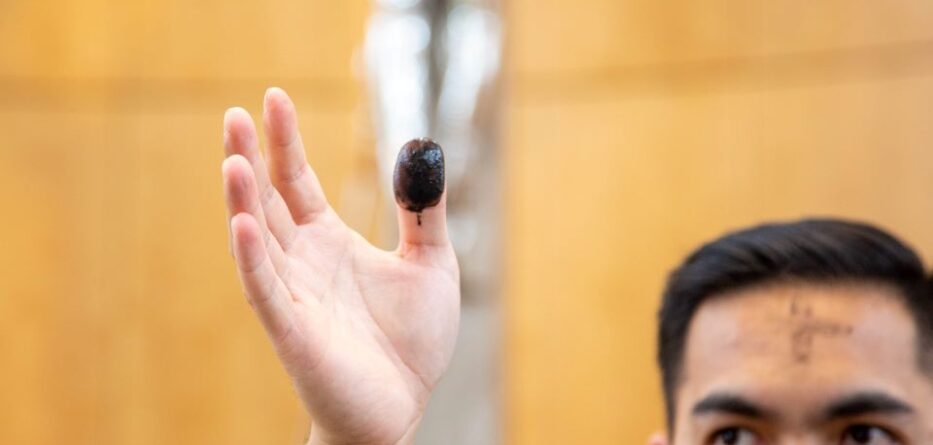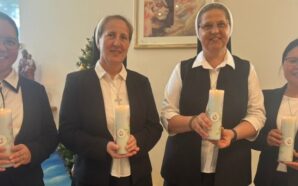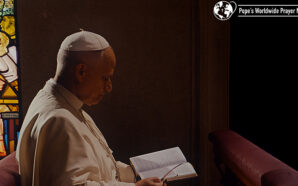Homily for the 1st Sunday of Lent
Genesis 2:7-9; 3:1-7; Psalm 50; Romans 5:12-19; Matthew 4:1-11
26 February 2023
Listen at https://soundcloud.com/frank-brennan-6/homily-26223
On Wednesday, we started our 40-day Lenten observance in preparation for Easter. The palms from last year’s Palm Sunday had been burnt. The ashes were blessed and applied to our foreheads. Nowadays, the priest often says, ‘Repent, and believe in the Gospel.’ I prefer the old-time formula: ‘Remember that thou art dust, and unto dust thou shalt return.’ That old-time formula had a great resonance for me this year, it being the first Ash Wednesday since the death of both my parents. We have placed their ashes together, side by side, in the columbarium at their old parish church. For 90 years and more, both Mum and Dad every Ash Wednesday approached the altar to hear those words proclaimed in Latin and in English: ‘Remember that thou art dust, and unto dust thou shalt return.’ And now they have returned. For each of us, our turn will come.
In today’s first reading from Genesis we hear part of the great fable of human creation and our existential reality. ‘The Lord God fashioned man of dust from the soil. Then he breathed into his nostrils a breath of life, and thus man became a living being.’ God did not create us to be alone. The fable has it that all different types of beasts were created to accompany us. But none proved suitable, not even the cunning, eloquent snake. And thus from the one person emerged man and woman. They were together in the garden of Eden with ‘every kind of tree, enticing to look at and good to eat, with the tree of life and the tree of the knowledge of good and evil in the middle of the garden’. The Lord allowed them to eat of every tree, ‘but of the tree of the knowledge of good and evil you shall not eat, for on the day you eat of it you shall die’.
Then comes the encounter with the snake, ‘the most subtle of all the wild beasts’. The snake overstates the Lord’s prohibition asking ‘Did God say, “you shall not eat of any tree of the garden?”.’ The woman corrects the serpent but in her own way overstates the Lord’s prohibition saying they are not allowed to eat or even touch the tree in the middle of the garden. Each overstatement renders the Lord’s command more arbitrary and irrational. Why would you be prohibited from eating the fruit of all trees? Why would you be prohibited from even touching a particular tree? The spirit of inquiry and curiosity of the man and woman are not to be constrained by the Lord’s command especially in relation to the tree which ‘was good to eat and pleasing to the eye, and … desirable for the knowledge that it could give’. Such curiosity and quest for knowledge comes at a price. We humans reach for all we can, for all that we desire, for all that appeals to us, but some things are beyond our reach or ought be. In over-reaching, we breach the sacred relationship of creature and Creator. The man and woman notice their nakedness. But presumably they always had noticed. What’s new is the sense of shame in what they notice. When they hear the Lord walking in the garden in the cool of the day, they hide themselves from the Lord among the trees of the garden.
During Lent, we are invited to repent and emerge from our hiding. With God’s grace, we might put our shame behind us. We are invited to take up some form of penance. Pope Francis tells us, ‘Lenten penance is a commitment, sustained by grace, to overcoming our lack of faith and our resistance to following Jesus on the way of the cross.’ In this year’s Lenten message Francis has urged us not to ‘take refuge in a religiosity made up of extraordinary events and dramatic experiences, out of fear of facing reality and its daily struggles, its hardships and contradictions’.[1] Rather we should listen to the Lord: ‘First, in the word of God, which the Church offers us in the liturgy. May that word not fall on deaf ears…
In addition to the Scriptures, the Lord speaks to us through our brothers and sisters, especially in the faces and the stories of those who are in need.’ In his encyclical Laudato Si, On Our Common Home, Francis expanded the class of those in need to ‘the earth herself, burdened and laid waste’ as being ‘among the most abandoned and maltreated of our poor; she “groans in travail” (Rom 8:22). We have forgotten that we ourselves are dust of the earth (cf. Gen 2:7); our very bodies are made up of her elements, we breathe her air and we receive life and refreshment from her waters.’[2]
The American theologian Elizabeth A Johnson in her book Ask the Beasts: Darwin and the God of Love says: ‘A flourishing humanity on a thriving planet rich in species in an evolving universe, all together filled with the glory of God: such is the vision that must guide us at this critical time of Earth’s distress, to practical and critical effect. Ignoring this view keeps people of faith and their churches locked into irrelevance while a terrible drama of life and death is being played out in the real world. By contrast, living the ecological vocation in the power of the Spirit sets us off on a great adventure of mind and heart, expanding the repertoire of our love. The beasts ask of us no less.’[3]
Remember that thou art dust, and unto dust thou shalt return.
Have mercy on me, God, in your kindness.
In your compassion blot out my offence.
O wash me more and more from my guilt
and cleanse me from my sin.
Remember that thou art dust, and unto dust thou shalt return.
My offences truly I know them;
my sin is always before me.
Against you, you alone, have I sinned;
what is evil in your sight I have done.
Remember that thou art dust, and unto dust thou shalt return.
A pure heart create for me, O God,
put a steadfast spirit within me.
Do not cast me away from your presence,
nor deprive me of your holy spirit
Remember that thou art dust, and unto dust thou shalt return.
Give me again the joy of your help;
with a spirit of fervour sustain me.
O Lord, open my lips
and my mouth shall declare your praise.
Remember that thou art dust, and unto dust thou shalt return.
Fr Frank Brennan SJ is the Rector of Newman College, Melbourne, and the former CEO of Catholic Social Services Australia (CSSA). He was appointed a peritus at the Fifth Plenary Council of the Australian Catholic Church.








